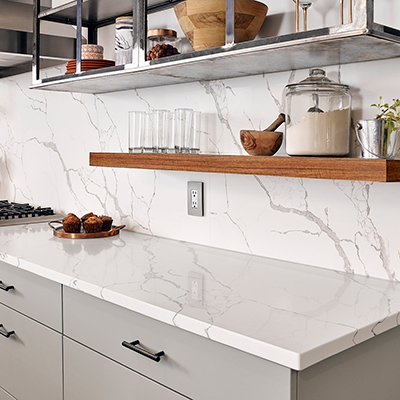Quartz vs. Granite Countertops

Last updated June 25, 2024
When it comes to choosing the right countertop material, two popular options stand out – granite and quartz. Both stones are beautiful and popular. Choosing which material is best means looking at the qualities of quartz vs. granite countertops. Read on to learn the difference between granite and quartz including the pros and cons of each type of stone.
Table of Contents
What is Quartz?
What is Granite?
Pros and Cons of Granite Countertops
Pros and Cons of Quartz Countertops
Choosing Between Quartz vs. Granite Countertops
Environmental Impact and Cost Considerations
What is Quartz?

Quartz is a natural stone that comes in several colors such as white, pink, purple, brown and black. Quartz countertops are created from crushed quartz crystals combined with resin, pigments and other synthetic materials. Because of this manufacturing process, they are considered “engineered stone.”
What is Granite?

Granite comes in one-of-a-kind slabs. Granite’s color depends on where it was mined and can vary from subtle earth tones to red, blue and green tones. Each slab has natural variations that add unique character. Granite countertops are custom cut and polished from these slabs for installation.
Unlike quartz countertops, the natural integrity of the stone remains untouched.
Pros and Cons of Granite Countertops

A luxury material, granite slabs are one-of-a-kind. Granite’s color depends on where it was mined and can vary from subtle earth tones to brighter blue, red and green tones. Each slab has natural variations that add unique character.
Pros:
- Distinct colors and patterns
- Very durable, granite is hard to scratch or stain
- Can stand up to high temperatures without getting damaged
- Granite countertops can increase property value
Cons:
- Can chip and crack due to natural striations or grooves in the stone
- Very porous so it easily absorbs stains from oils, food or wine
- May be difficult to match for future project
Pros and Cons of Quartz Countertops

Since they are engineered, quartz countertops have advantages that other natural materials like granite don’t have. Quartz countertops are available in solid colors that resemble other natural stones like granite or marble. The pattern and hues are much more uniform than granite.
Pros:
- Available in any color or pattern
- Non-porous, resistant to stains and cracks
- No sealing or special cleaning solutions needed
Cons:
- Can look man-made
- Not heat resistant, high temperatures can damage surface
- Can discolor over time
Choosing Between Quartz vs. Granite Countertops

Both granite and quartz offer unique advantages as countertop materials. Granite is the ideal choice for those who prefer an all-natural stone with distinct patterns and who don’t mind the extra maintenance. Quartz is perfect for anyone who wants an easy-to-maintain, uniform stone look that comes in almost unlimited colors.
Environmental Impact and Cost Considerations

When it comes to quartz vs. granite countertops, the environmental impact is something to think about.
Quartz is a man-made material, so it’s not biodegradable. Some brands of quartz countertops may contain chemicals. On the other hand, granite is an all-natural, biodegradable material. However, certain sealants for granite countertops can have an environmental impact. No matter which type of countertop you choose, make sure that any chemicals or sealants used are eco-friendly.
Budget is another thing to consider when choosing between quartz vs. granite. There is very little difference between granite and quartz countertops when it comes to price. Sometimes the price of granite is lower. However, certain granite colors or patterns can also require a higher investment based on their availability.
Quartz vs. Granite Maintenance Tips

Because it's porous, granite needs to be sealed and resealed
every year
to help resist stains and bacteria.
For granite:
- Messes should be wiped up with a cloth as quickly as possible to avoid staining.
- Choose mild soap and water or a daily granite cleaner. Other cleaners may be too harsh.
- Installing black granite countertops or dark brown granite countertops can help disguise lasting marks and stains.
Quartz does not need to be sealed and will not absorb stains or bacteria.
Even white quartz countertops will not stain.
Additionally, many quartz manufacturers add
an antibacterial coating to further protect the countertop from carrying germs. For quartz countertops:
- Use a mild cleaner and soft cloth or sponge.
- Avoid using anything that can scratch the surface such as steel wool.
- Place hot pots or dishes on trivets to prevent damage.
Quartz countertops are made of “engineered stone" and have a low maintenance, uniform look. Granite countertops are unique slabs of mined stone that require more care than quartz. Both options are durable and beautiful. When you're ready to install your new custom countertops, use The Home Depot Mobile App to locate products and check inventory. We'll take you to the exact aisle and bay. Ask us about professional installation services.
































